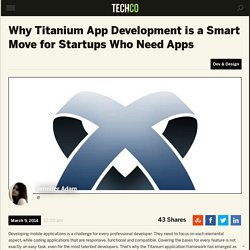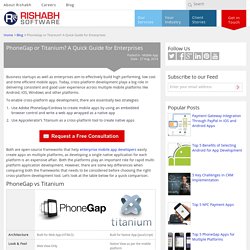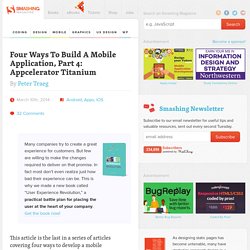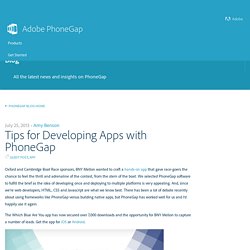

Why Titanium App Development is a Smart Move for Startups Who Need Apps. Developing mobile applications is a challenge for every professional developer.

They need to focus on each elemental aspect, while coding applications that are responsive, functional and compatible. Covering the bases for every feature is not exactly an easy task, even for the most talented developers. That’s why the Titanium application framework has emerged as one of the best for extensive mobile applications. Titanium Framework: Overview Titanium is an open-source mobile apps development framework by Appcelerator and licensed under Apache. Features of Titanium Framework Development The Titanium framework is loaded with exhilarating features, which is why it has become one of the most preferred frameworks among developers. 1. 2. Comparison between two cross-plaftform development frameworks. Posted in - Mobile App Date - 27 Aug. 2014 Business startups as well as enterprises aim to effectively build high performing, low cost and time efficient mobile apps.

Today, cross-platform development plays a big role in delivering consistent and good user experience across multiple mobile platforms like Android, iOS, Windows and other platforms. To enable cross-platform app development, there are essentially two strategies: Four Ways To Build A Mobile Application, Part 4: Appcelerator Titanium. Advertisement Many companies try to create a great experience for customers.

But few are willing to make the changes required to deliver on that promise. In fact most don’t even realize just how bad their experience can be. This is why we made a new book called “User Experience Revolution,” a practical battle plan for placing the user at the heart of your company. Get the book now! This article is the last in a series of articles covering four ways to develop a mobile application. PhoneGap enabled us to build a tip calculator app quickly and have it run on both the Android and iOS platforms.
By contrast, Appcelerator Titanium applications render the UI using the platform’s native controls. Here’s the Appcelerator Titanium version of our sample FasTip application running on both iOS and Android: Android - Is PhoneGap a good choice for App Development? Tips for Developing Apps with PhoneGap. Oxford and Cambridge Boat Race sponsors, BNY Mellon wanted to craft a hands-on app that gave race-goers the chance to feel the thrill and adrenaline of the contest, from the stern of the boat.

We selected PhoneGap software to fulfill the brief as the idea of developing once and deploying to multiple platforms is very appealing. And, since we’re web developers, HTML, CSS and Javascript are what we know best. There has been a lot of debate recently about using frameworks like PhoneGap versus building native apps, but PhoneGap has worked well for us and I’d happily use it again. The Which Blue Are You app has now secured over 7,000 downloads and the opportunity for BNY Mellon to capture a number of leads. Get the app for iOS or Android. Building these apps has been a learning process for us so I thought it might be useful to share some of things I’ve learned along the way. Test on Real Phones In the world of iOS, things aren’t too bad, using Xcode and the iPhone emulator is fairly realistic. Native vs Hybrid App Development. People enjoy using their smartphones because they can accomplish many things on the go such as reading e-mails, social networking, watching movies and plenty of other activities.
We enjoy smartphones because they have many applications that make everyday activities easier. If you are thinking of developing for the mobile application market, an important decision is to decide between developing a native application or a hybrid one. It’s an age old question that refuses to go away, we thought it was time to revisit… Which is the best? Native over Hybrid Building native applications means using the native language of the platform, Objective-C on iOS, and Java on Android. Best performance includes fast and fluid animations as well as full access to phone hardware, multi touch support and the latest APIs.
Native development is far from easy. Going Native Let’s take iOS for example. You can get a great intro to Objective-C by creating your own Flappy Bird game in your browser.